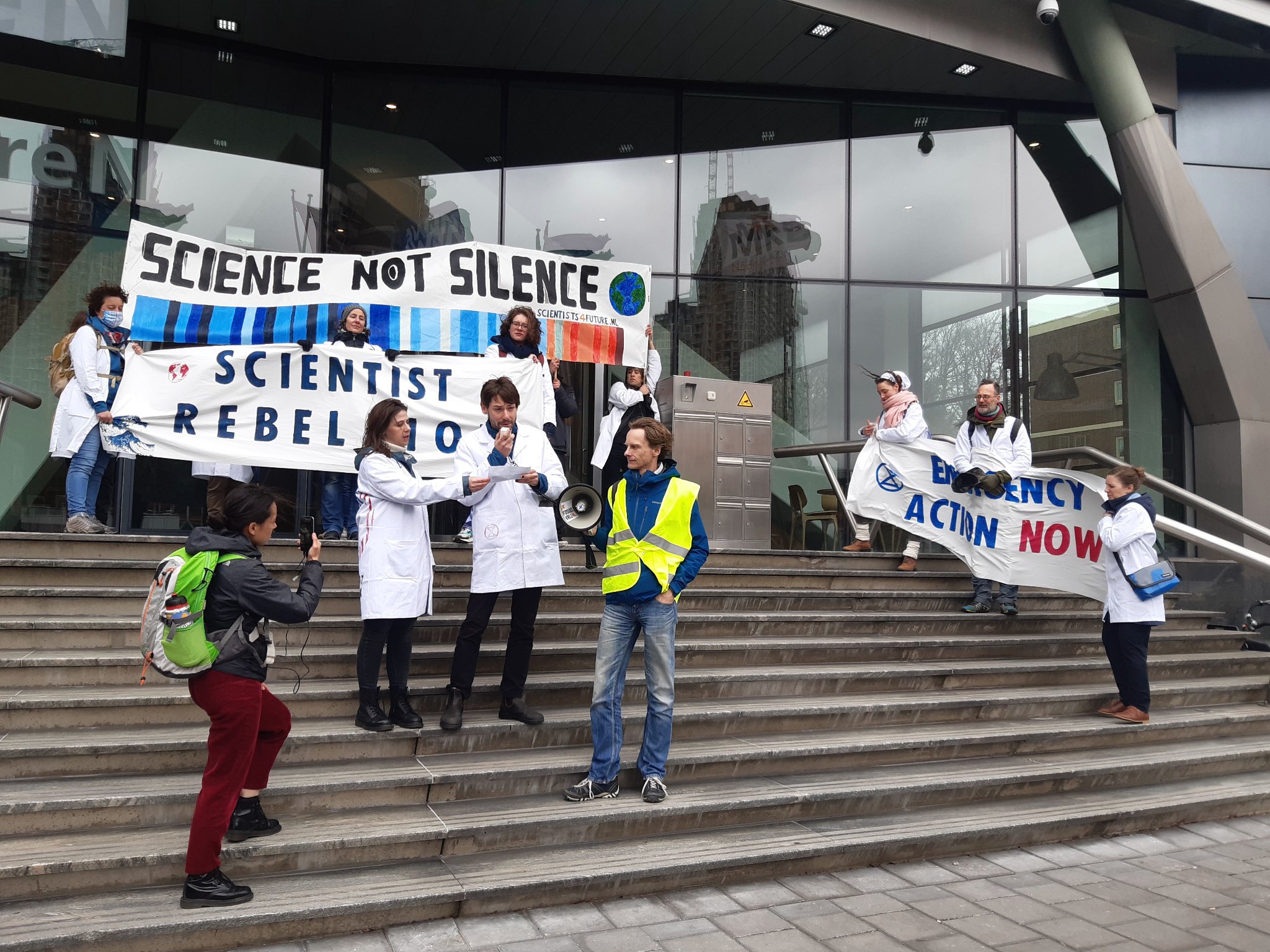Scientists must be at the forefront of the climate movement, according to Scientist Rebellion. Wednesday they join a demonstration against gas drilling in the Wadden Sea.
Scientists affiliated with Scientist Rebellion Netherlands during an earlier demonstration. (Photo: Facebook page Scientist Rebellion NL)
Is the government really going to issue a new licence for gas extraction in the Wadden Sea? Action groups and researchers have been sounding the alarm for months, and the climate activists of Scientist Rebellion have also expressed concern. Now they are planning a demonstration at the ministries of Economic Affairs and Nature. They say that drilling for fossil fuels in previously untapped areas is “a crime against humanity” and warn of ecological damage.
One of the organisation’s activists is Guus Dix, assistant professor at the University of Twente. He is also involved in the Extinction Rebellion movement. “This gas isn’t going to keep us warm this winter”, says Dix, “since we won’t be able to start extracting it for years.”
Why are you calling on scientists in particular to join the climate movement?
“All the knowledge we have about climate change and ecology was produced by scientists. We know that large parts of the planet will become uninhabitable if we continue on our current trajectory. Scientists have spent the last three or four decades trying to call attention to the fact that the climate is deteriorating, to very little – if any – effect. Carbon emissions keep rising.”
Should scientists get more involved in activism?
“Scientists used to think that they just had to provide good information and that it was up to other parties to do something with it. That’s the traditional division of roles. But that model is basically bankrupt. It’s been scientifically proven that just providing knowledge does little or nothing to address the problems we’re facing. More and more scientists now believe that they have a civic duty to effect change.”
Should they go to more climate marches?
“Climate marches are very important, but more needs to be done. At the largest march here in the Netherlands, 40,000 people took to the streets. Rutte said: thank you, I hear what you’re saying. And then did nothing. We have to show that we are willing to commit acts of civil disobedience.”
‘We must be prepared to break laws’
Are you planning on driving a caravan of tractors to The Hague?
“We don’t have tractors, but without some kind of confrontation little is going to change, I’m afraid. We must be prepared to break laws and suffer the consequences.”
Do actions like that help?
“Pension fund ABP is pulling out of fossil fuels, which is partly thanks to activists who entered their headquarters every few weeks and refused to leave until their demands were met. They had to be removed by the police every single time.”
Have you participated in such actions yourself?
“Yes, two weeks ago we blocked a railway track in Amsterdam to stop a coal train. That’s civil disobedience: making sure that train can’t pass until law enforcement takes you away. It disrupts the routine.”
But Wednesday you will hold a ‘regular’ demonstration. How many people do you expect?
“That’s always hard to predict, but I hope to see between 30 and 50 people.”
- The demonstration will be held on Wednesday 28 September at 4 p.m. in front of the ministries of Economic Affairs and Climate Policy and Agriculture, Nature and Food Quality, at Bezuidenhoutseweg 73 in The Hague. Scientist Rebellion will be joined by Ocean Rebellion and the Utrecht aan Zeemanskoor, and there will be several speakers.
- Also read this opinion article: What is TU Delft’s responsibility in times of climate breakdown?
HOP, Bas Belleman
Translation: Taalcentrum-VU
Do you have a question or comment about this article?
redactie@hogeronderwijspersbureau.nl


Comments are closed.